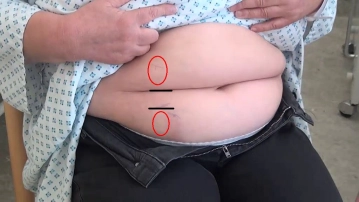- End-stage renal disease with planned peritoneal dialysis
-
Indications
-
Contraindications
- Patient not suited for peritoneal dialysis
- Abdominal cavity filled with polycystic kidneys
-
Preoperative diagnostic work-up
- Clinical examination: Abdominal wall hernia? History of abdominal surgery?
- Abdominal ultrasound study: Ruling out malignancies, assessing the size of polycystic kidneys and renal cysts
-
Special preparation
![Special preparation]()
Sitting position: Mark possible catheter exit sites outside of waistband and skin folds in red
1 week before surgery
- No more heparin or insulin injections into the abdominal wall, thereby sparing the surgical site and reducing the risk of infection
Day before surgery
- Standard preparation for surgery including umbilical care
- Enema the evening before the procedure
- Last meal the evening before surgery
- Preoperative markup with the patient standing and sitting
Since the CAPD is performed by the patient the catheter exit site must be easily visible for him/her. Thus, the exit site must not be located at the level of the waistband (outerwear/underwear), in skin folds or below a pendulous abdomen. Since most patients change the dialysate while sitting, the planned catheter exit site should also be checked before surgery with the patient sitting. The side of the catheter exit site – right or left – should not be specified beforehand because it may depend on possible adhesions discovered during the procedure.
Day of surgery
- Single-shot antibiotic before anesthesia is initiated
- Possibly Foley catheter for the duration of surgery
-
Informed consent
- Primarily for laparoscopy with assessment of the abdominal cavity
- Possibly for laparoscopic adhesiolysis
Complications
- Injury to the small and large intestines
- Injury to parenchymal organs
- Wound infection, abscess, peritonitis, revision surgery
- Abdominal wall hematoma, cutaneous emphysema
- Postoperative shoulder pain
- Thromboembolism
Catheter specific complications
- Catheter kinking
- Catheter malposition, leakage
Postoperative care
- Strict bed rest for 2 days
- Getting up only permitted when going to the bathroom
Intubationsnarkose bei Kapnoperitoneum ... - Operations in general, visceral and transplant surger
Activate now and continue learning straight away.
Single Access
Activation of this course for 3 days.
Most popular offer
webop - Savings Flex
Combine our learning modules flexibly and save up to 50%.
€44.50 / yearly payment
general and visceral surgery
Unlock all courses in this module.
€149.00 / yearly payment
